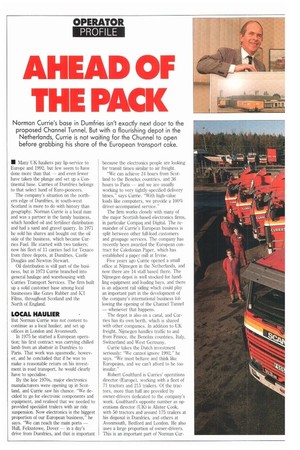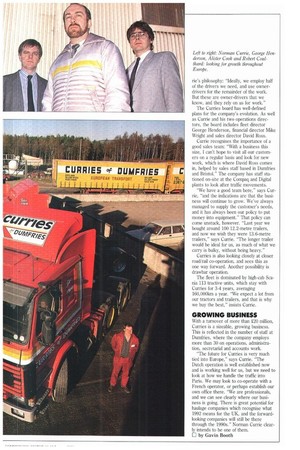AHEAD OF THE PACK
Page 62

Page 63

If you've noticed an error in this article please click here to report it so we can fix it.
Norman Currie's base in Dumfries isn't exactly next door to the proposed Channel Tunnel. But with a flourishing depot in the Netherlands, Currie is not waiting for the Chunnel to open before grabbing his share of the European transport cake.
• Many UK hauliers pay lip-service to Europe and 1992, but few seem to have done more than that — and even fewer have taken the plunge and set up a Continental base. Curries of Dumfries belongs to that select band of Euro-pioneers.
The company's situation on the northern edge of Dumfries, in south-west Scotland is more to do with history than geography. Norman Currie is a local man and was a partner in the family business, which handled oil and fertiliser distribution and had a sand and gravel quarry. In 1971 he sold his shares and bought out the oil side of the business, which became Curries Fuel. He started with two tankers; now his fleet of 11 carries fuel for Texaco from three depots, at Dumfries, Castle Douglas and Newton Stewart.
Oil distribution is still part of the business, but in 1973 Currie branched into general haulage and warehousing with Curries Transport Services. The firm built up a solid customer base among local businesses like Gates Rubber and ICI Films, throughout Scotland and the North of England.
LOCAL HAULIER
But Norman Currie was not content to continue as a local haulier, and set up offices in London and Avonmouth.
In 1975 he started a European operation; his first contract was carrying chilled lamb from an abattoir in Dumfries to Paris. That work was spasmodic, however, and he concluded that if he was to make a reasonable return on his investment in road transport, he would clearly have to specialise.
By the late 1970s, major electronics manufacturers were opening up in Scotland, and Currie saw his chance. "We decided to go for electronic components and equipment, and realised that we needed to provided specialist trailers with air ride suspension. Now electronics is the biggest proportion of our European business," he says. "We can reach the main ports — Hull, Felixstowe, Dover — in a day's drive from Dumfries, and that is important because the electronics people are looking for transit times similar to air freight.
We can achieve 24 hours from Scotland to the Benelux countries, and 36 hours to Paris — and we are usually working to very tightly-specified delivery times," says Currie. "With high-value loads like computers, we provide a 100% driver-accompanied service."
The firm works closely with many of the major Scottish-based electronics firms, in particular Compaq and Digital. Ile remainder of Cunie's European business is split between other full-load customers and groupage services. The company has recently been awarded the European contract for Caledonian Paper, which has established a paper mill at Irvine.
Five years ago Currie opened a small office at Nijmegen in the Netherlands, and now there are 14 staff based there. The Nijmegen depot is well stocked for handling equipment and loading bays, and there is an adjacent rail siding which could play an important part in the development of the company's international business following the opening of the Channel Tunnel — whenever that happens.
The depot is also on a canal, and Curries has its own berth, which is shared with other companies. In addition to UK freight, Nijmegen handles traffic to and from France, the Benelux countries, Italy, Switzerland and West Germany.
Currie takes the Dutch investment seriously: "We cannot ignore 1992," he says. We must behave and think like Europeans, and we can't afford to be too insular."
Robert Coulthard is Curries' operations director (Europe), working with a fleet of 71 tractors and 215 trailers. Of the tractors, more than half are provided by owner-drivers dedicated to the company's work. Coulthard's opposite number as operations director (UK) is Mister Cook, with 50 tractors and around 175 trailers at his disposal in Dumfries, and others at Avonmouth, Bedford and London. He also uses a large proportion of owner-drivers. This is an important part of Norman Cur He's philosophy: "Ideally, we employ half of the drivers we need, and use ownerdrivers for the remainder of the work. But these are owner-drivers that we know, and they rely on us for work."
The Curries board has well-defined plans for the company's evolution. As well as Currie and his two operations directors, the board includes fleet director George Henderson, financial director Mike Wright and sales director David Ross.
Currie recognises the importance of a good sales team: "With a business this size, I can't hope to visit all our customers on a regular basis and look for new work, which is where David Ross comes in, helped by sales staff based in Dumfries and Bristol." The company has staff stationed on-site at the Compaq and Digital plants to look after traffic movements.
"We have a good team here," says Curtie, "and the indications are that the business will continue to grow. We've always managed to supply the customer's needs, and it has always been our policy to put money into equipment." That policy can come unstuck, however. "Last year we bought around 100 12.2-metre trailers, and now we wish they were 13.6-metre trailers," says Currie. "The longer trailer would be ideal for us, as much of what we carry is bulky, without being heavy."
Curries is also looking closely at closer road/rail co-operation, and sees this as one way forward. Another possibility is drawbar operation.
The fleet is dominated by high-cab Scania 113 tractive units, which stay with Curries for 3-4 years, averaging 160,000km a year. "We expect a lot from our tractors and trailers, and that is why we buy the best," insists Currie.
GROWING BUSINESS
With a turnover of more than £20 million, Curries is a sizeable, growing business. This is reflected in the number of staff at Dumfries, where the company employs more than 30 on operations, administration, secretarial and accounts work.
"The future for Curries is very much tied into Europe," says Currie. "The Dutch operation is well established now and is working well for us, but we need to look at how we handle the traffic into Paris. We may look to co-operate with a French operator, or perhaps establish our own office there. "We are professionals, and we can see clearly where our business is going. There is great potential for haulage companies which recognise what 1992 means for the UK, and the forwardlooking companies will still be there through the 1990s." Norman Currie clearly intends to be one of them.
E by Gavin Booth
















































































































